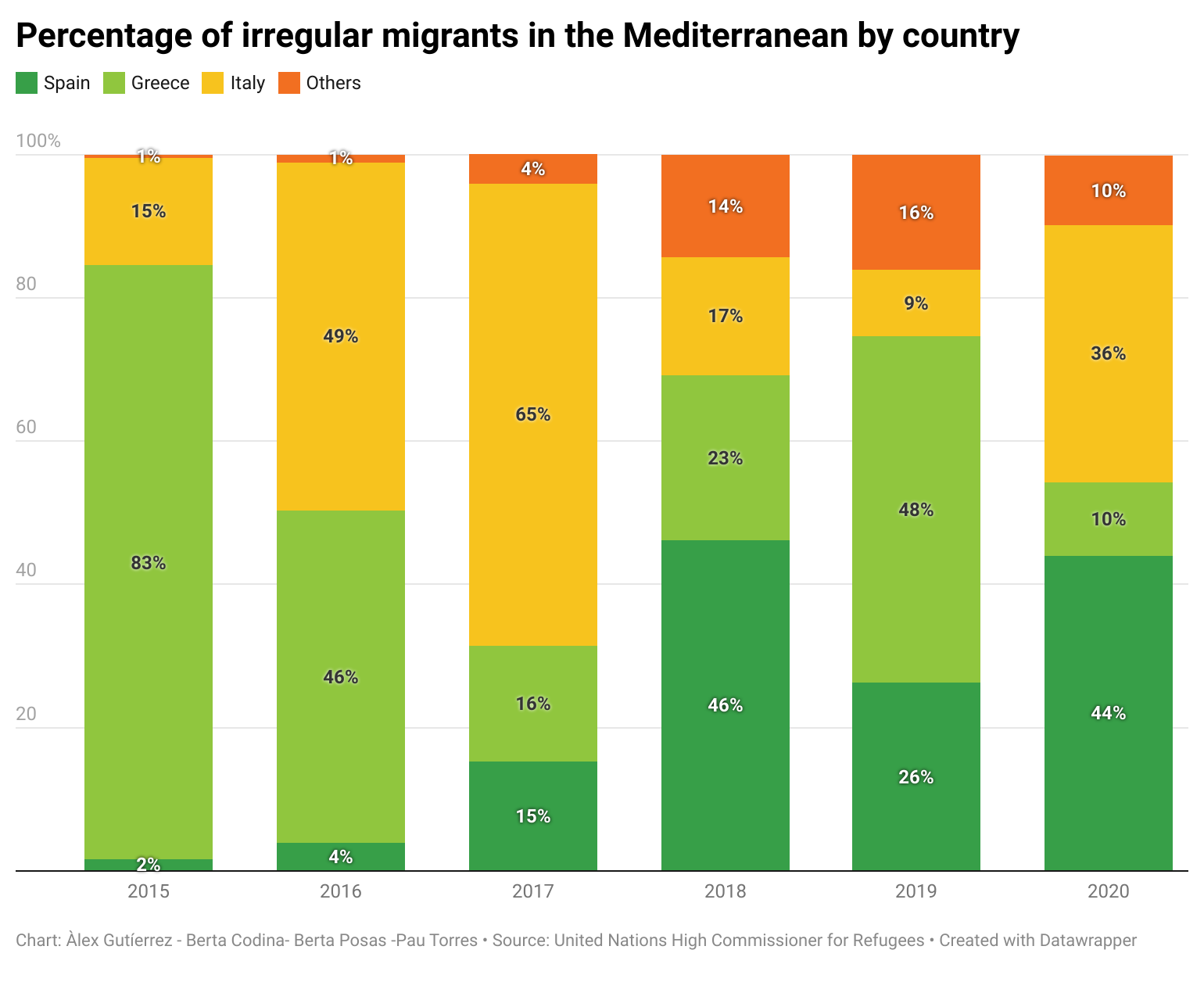On November 26th 2019, Jorge Buxadé, Spanish delegate for the far-right political party VOX at the European Parliament, made a speech in which he affirmed that the current government’s immigration policies are to blame for making Spain’s coasts “the principal entrance for illegal immigration in Europe”. In our fact-check we analysed these assertions to prove whether they hide certainty or are fallacies with xenophobic intentions. In this blogpost we reflect on the context and the sources employed to check VOX’s claims.
Context
It is undeniable that far-right parties are on the rise in many countries in Europe. In this sense, we should consider the irruption of the National Rally in France, the second-highest voted force in the 2017 presidential elections; Alternative for Germany, which brought the far-right ideology back in the Bundestag since 1945; or the aforementioned VOX, now holding 52 seats in Spain’s lower chamber.
As far-right parties rise to power, so do their policies against irregular migrants, which have become an especially remarkable issue since the refugee or migrant crisis intensified in 2015. That year, more than a million people crossed the Mediterranean in search of a better life, usually escaping conflict or situations of extreme poverty, as declared publicly by the European Parliament in November 2020. In 2015, Greece took in 83% of the migrants, 15% went to Italy and Spain admitted roughly 2% of them. However, this dynamic has changed since then. From 2017 to 2018, during Mariano Rajoy’s presidency in Spain (then, the main leader of the People’s Party or Partido Popular, of the conservative right), went from receiving 15% to 46% of the total irregular migrants.
This number has changed throughout the years. In 2019, the number of illegal border crossings to the EU was less than 142,000, 92% lower than in 2015. Despite that, immigration policies have remained on the daily agenda. Media coverage is clearly affected by alt-right ideology, which claims that migrants are a problem for the socioeconomic stability of European countries.
Sources employed to check VOX’s claims
Returning to the matter of the Spanish coasts, we started checking official information, especially from the United Nations High Commissioner for Refugees (UNHCR). This data helped understand if Buxadé’s statement is trustworthy, since UNHCR keeps a record of the irregular migrants that have entered Spain, and therefore Europe, from 2016 up until 2020.

UNHCR data on refugees and migrants’ arrivals to Europe by sea and land
As proven before, the increase of arrivals of irregular migrants in Spain started while the Popular Party (PP) was still in power. During the first year of Pedro Sanchez’s mandate, Spain gathered 26% of all European entries. We can confirm, then, that the current government and its immigration policies have not made the number of irregular immigrants rise. Despite what this information suggests, we cannot rush to refuse VOX’s statement. The party makes multiple assumptions that still need to be verified even if the start of Pedro Sanchez’s mandate was not the reason for the increase of arrivals.
UNHCR’s information has also a European perspective. Their data allows us to scrutinize the evolution of immigration in the Mediterranean Sea. Greece, Italy and Spain have all led the list of entry coasts for irregular immigrants over the last few years, but there has not been a consistent flow of arrivals. The numbers confirm that Spain was the main entry point in the Mediterranean Sea to Europe in 2020, followed by Italy. However, we would like to highlight the importance of keeping in mind that the fluctuation of migrants is constantly changing, despite VOX’s statement being true and even if the situation is not proven to be linked to Pedro Sánchez’s presidency.
In addition to all of these findings and further away from the official UNHCR’s information, we checked the article “España inyecta a Marruecos otros 30 millones de euros para frenar la inmigración irregular” (Translated to “Spain will give Morocco €30 million to curb irregular immigration”) from El País, Spain’s most read general information-oriented newspaper. The article also explains that this amount of money was added to the 140 million euro that the EU paid the same country with the same purpose. This allows us to explain the stability of migrations at one of the lowest points since the migrant crisis intensified in 2015. This payment, though, is not necessarily determining for the migrants, as the Mediterranean crossings increase once again at the very beginning of 2021, while Pedro Sánchez is still in charge of the Spanish government, and in chronological concordance with the massive arrival of irregular migration at the Canary Islands.
Read our fact-check on VOX’s claims about immigration here.
RESEARCH | ARTICLE © Berta Posas, Berta Codina, Àlex Gutiérrez and Pau Torres, Universitat Pompeu Fabra, Barcelona, ES
Leave your comments, thoughts and suggestions in the box below. Take note: your response is moderated.







